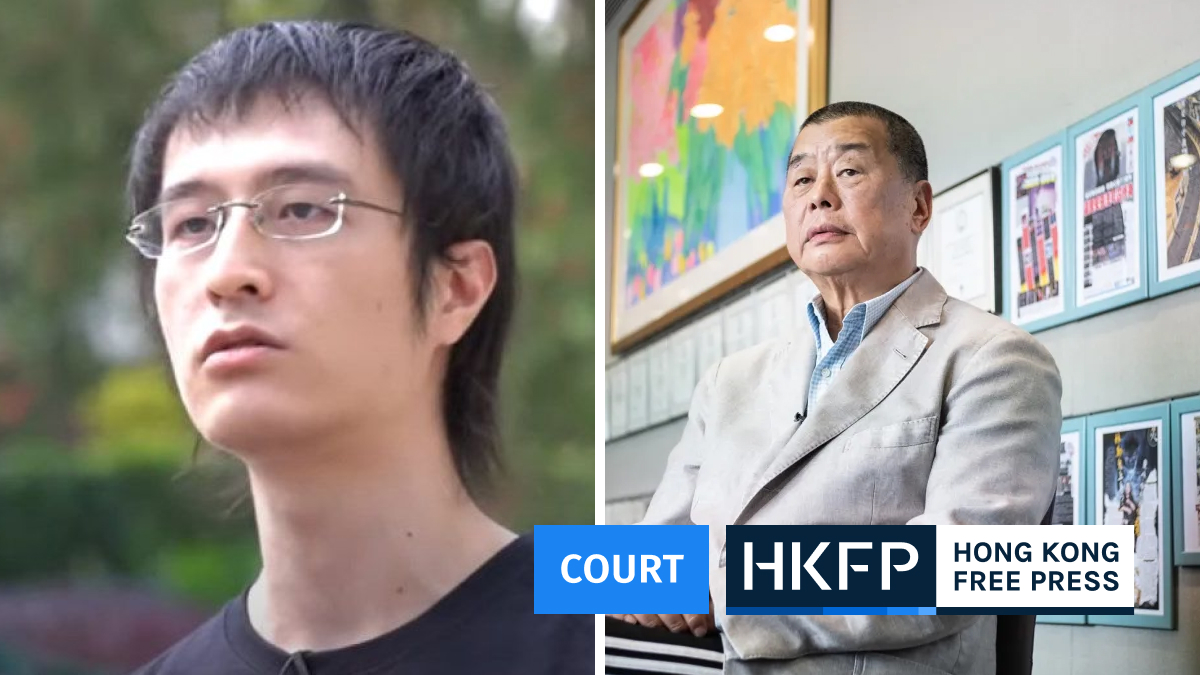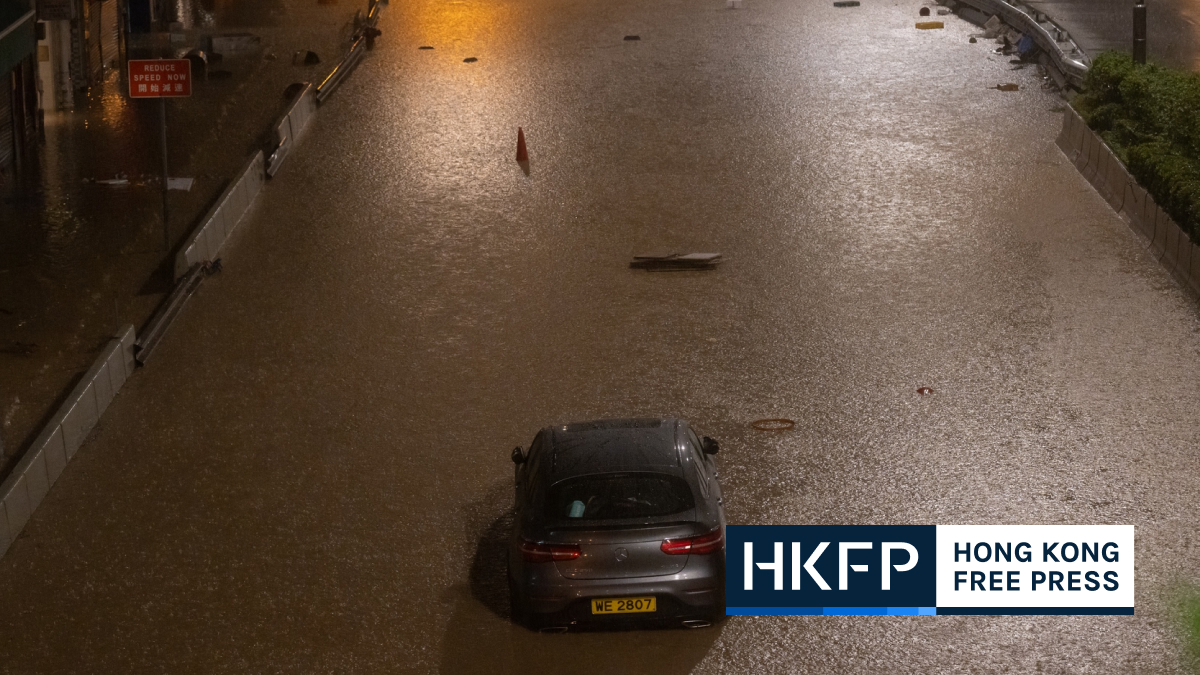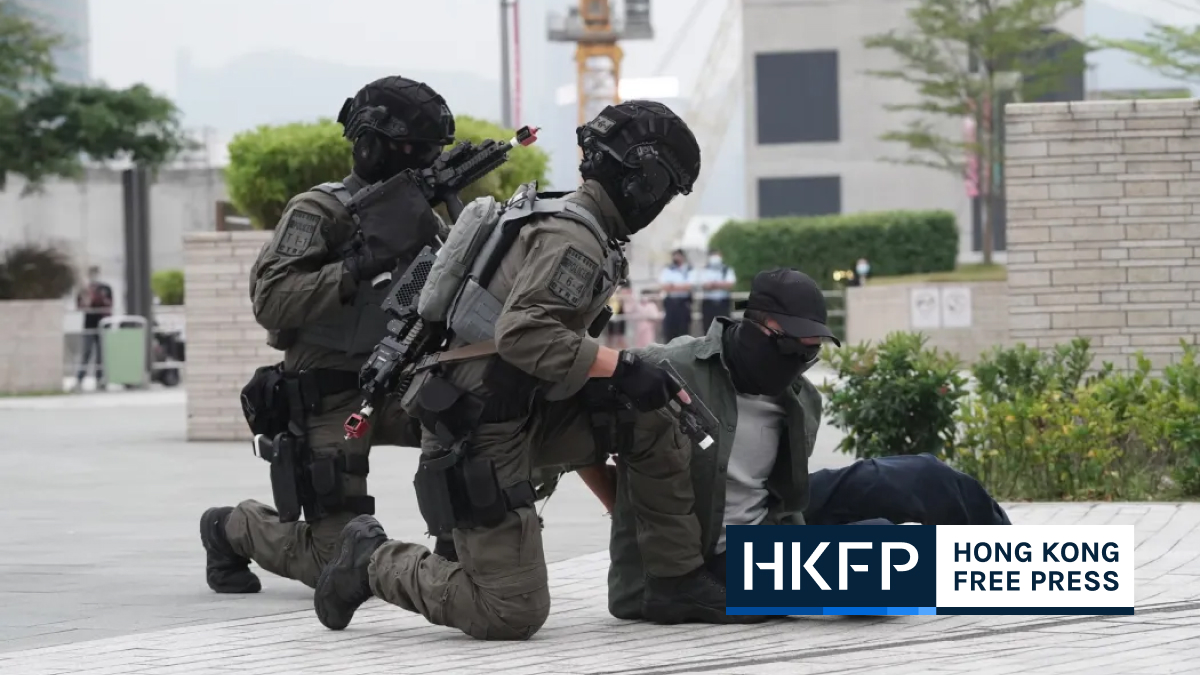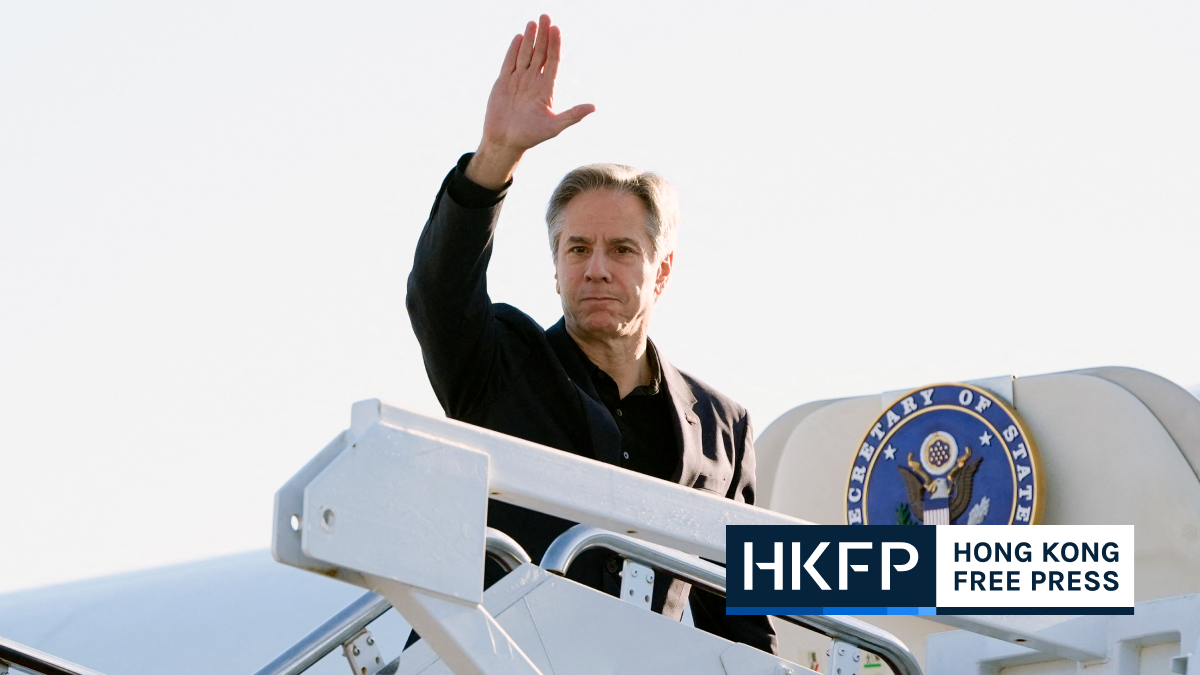Amid otherwise neutral tones, a neon-orange sticker asserts its presence. A fixture of the chipboard desk that runs the length of the windowsill, it marks a distance of 1.5 metres from the wall – the work space afforded to each employee at a Hong Kong newsroom that fell foul of the city’s national security law.
“That was our editor-in-chief, who cared so much for labour rights,” Kris Lau says, explaining the story of the small circular marker. “One day he took out a ruler and made sure everyone had the same amount of space.”
He speaks softly but spiritedly between sips of Vita Lemon Tea. A tattoo on his forearm of the Stand News logo with “29.12.2021” beneath it is impossible to ignore. “I did this after the incident,” he says of his ink, referring to the day that police raided the outlet and arrested several figures linked to it, forcing its closure.
The desk, Lau, and an additional two of the five partners behind Have a Nice Stay, a recently opened bookstore in Mong Kok, came from Stand News. “I will not name [my colleagues],” Lau says, “but they’re all from some media outlets which have collapsed.”
The idea for a bookstore arose among them partly from necessity – “because we were unemployed… we have to make a living” – and partly from the desire to build on their experience as journalists and to create a space where people could gather. They thought about opening a cafe, but decided a bookshop would be easier.
“Because we were all reporters, we [thought we] could use some of our strengths to open a bookstore,” Lau says. “We know some people from the publishing industry and we write, we read, so maybe we have some sense [of how] to choose the books.”

In early June, a week and a day into the shop’s soft opening, the stock – much of it literary journalism – is still being selected and the shelves are still being filled with titles that reflect the founders’ media credentials.
Lau arrives for his interview a little late and a little out of breath from carrying a delivery up four flights of stairs. In the grand tradition of independent Hong Kong bookstores, Have a Nice Stay avoids the high rents of ground floor retail spaces by requiring its patrons to ascend a staircase. In this instance, one that is adorned unseasonably in tinsel.
“I sell one book and I earn HK$30,” Lau says against a backing track of piano jazz and the sound of brown paper packages being ripped and unwrapped. “It is not a secret. Everyone knows the margin of selling books.” But he is not in the business to become a millionaire, he says, “just to make a living and do something that carries the values we cherish.”
Faith in the Fourth Estate
After 10 years as a medical reporter, and despite experiencing first hand the perils faced by press freedom in the city, Lau has kept his faith in the media. “Even though I cannot work as a reporter – I lost that title – I want to give something back to the industry. I hope that with this bookstore, we can promote journalistic values to all people in Hong Kong,” he says.
“When people know what journalism is, then the Fourth Estate can be empowered. The power of the media comes from citizens. [When] they believe in the media and they trust the media, then the media has the power to monitor other powers. So, it is very important that the citizens know… what journalism is. That is what I really want to carry out.”

The mission feels all the more pressing amid muted commemorations for the 33rd anniversary of the Tiananmen crackdown, widely seen as a barometer of free expression in the city, and a much publicised exodus of Hongkongers since the national security law was enacted in June 2020.
Booksellers have been among those leaving. When Albert Wan, the owner of Bleak House Books, shut up shop and departed with his family for the US last year, the narrative among English-language readers was that it was a death knell for independent bookstores in the city. Lau says that is not the case, estimating that there are around 50 in existence; not everyone is migrating.
“We are five people who have stayed [in Hong Kong]… and we just want to establish a place that allows those people who have stayed, to stay.” He conjures a Cantonese term that describes people coming together to eat hot pot, “waih louh” (圍爐). “It means surrounding the pot and having a chit chat… it means we keep in contact with our friends, we share our happiness or our sadness, that is waih louh, surrounding the pot,” he says.
“We just want to establish a place for people who stay [in Hong Kong] to come over and waih louh.”
Space for community, connections
It is not only Lau and his partners who are seeking to create space for community amid societal shifts. Across the water on Cheung Chau, seven adults and two children – all of them relatively recent implants to the outlying island – had the same idea, leading to the opening of To-day Bookstore last September.
Located in a narrow, canary-yellow shophouse complete with a traditional gable roof and tram-green features, To-day is the small island’s first bookstore. “We’re a group of friends… [and] we wanted a place together, because we often gather, especially during Covid,” one of the partners, Vanessa Lai, says.

Very much a collective effort, the diminutive space embodies each founder’s interests and abilities. The logo was designed by one, an art teacher, while another two crafted the bookshelves. An American skateboard magazine comes courtesy of one with contemporary counter-culture leanings, and there is a book for sale by the eldest of the children involved that follows the story of a flower and some farts.
Lai, who still has a full-time job but is there when she can be, is most animated when discussing the store’s selection of zines. “I used to go to ACO – Art and Culture Outreach – and they have a huge collection of zines,” she says. “I like reading them, too, that’s why we’re bringing them here.” To-day stocks zines by the likes of Pop & Zebra, Michael Leung and Gwo Bin, all of them created by Hongkongers.
It also has a music section, with CDs from Hong Kong artists, including one that tells the story of the 2014 Umbrella Movement – a 79-day-long pro-democracy civil disobedience campaign – through audio recordings. Another explores the city’s Hakka culture through karaoke, “Hakkaraoke,” put together by a friend of To-day.

And then there is a grocery section, selling soap, soy sauce, toilet paper and other essentials. “We’re bringing these brands to Cheung Chau because they are made in Hong Kong,” Lai says.
“There are some aunties, they come straight in, grab their toilet paper and go. They know what they want.” As for books, “some of our neighbours, especially when there are not many people coming to the island, come for hours and read and spend time here,” she says.
“We think the bookstore is a continuation of this sense of community that’s already very established on the island,” adds co-founder Sim Ho, a former journalist with a passion for dance.

Indeed, the partners behind To-day all met “through the island,” Lai says. “It’s not until I lived on the island that I connected with my neighbours.”
‘Major historical moment’
Forging connections such as these can prove vital whenever there are major changes in the structure of communities, says Lucy Porter Jordan, an associate professor at the University of Hong Kong’s Department of Social Work and Social Administration.
“In Hong Kong, we are living through, in the last few years, what I would call a major historical moment,” Jordan says, during which the meaning of community is “being redefined by the historical forces, as well as the things that are being set [in motion] in response to those forces.”
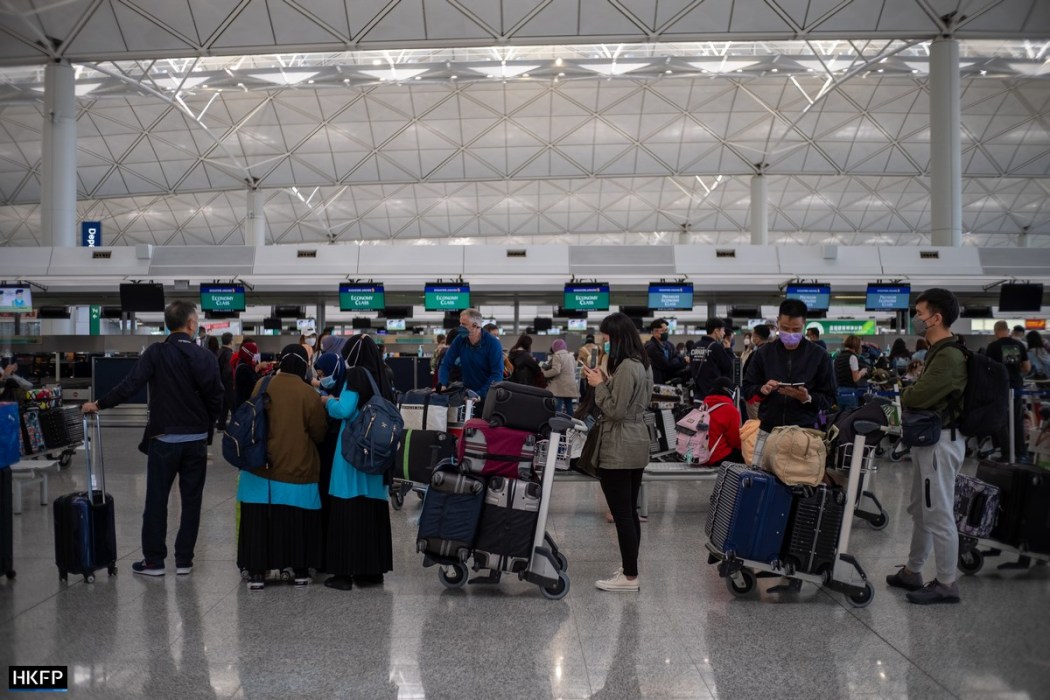
Arguably, one such response is the exodus, which can be measured in school vacancies and pension fund withdrawals more easily than in its impact on those who choose not to leave. “You have this acute awareness that, indeed, the people who are staying here are not so much the focus,” Jordan says. “And actually they are the people who are experiencing these repeated changes… I think there can be a lot of risk there for those who are staying.”
However, Porter says that rapid change, such as Hong Kong is currently experiencing, can also breed opportunity. “There can be this mindset of trying to figure out different ways to do things, to foster a sense of community, a place of connection,” she says.
At Mount Zero Books – a veteran when compared to Have a Nice Stay and To-day – that sense of community is axiomatic. It is evident in the picnic chairs placed outside the small shop front filled with readers, the way the manager asks a neighbouring store for mosquito repellent if a customer complains of being bitten, the warmth with which everyone is met.
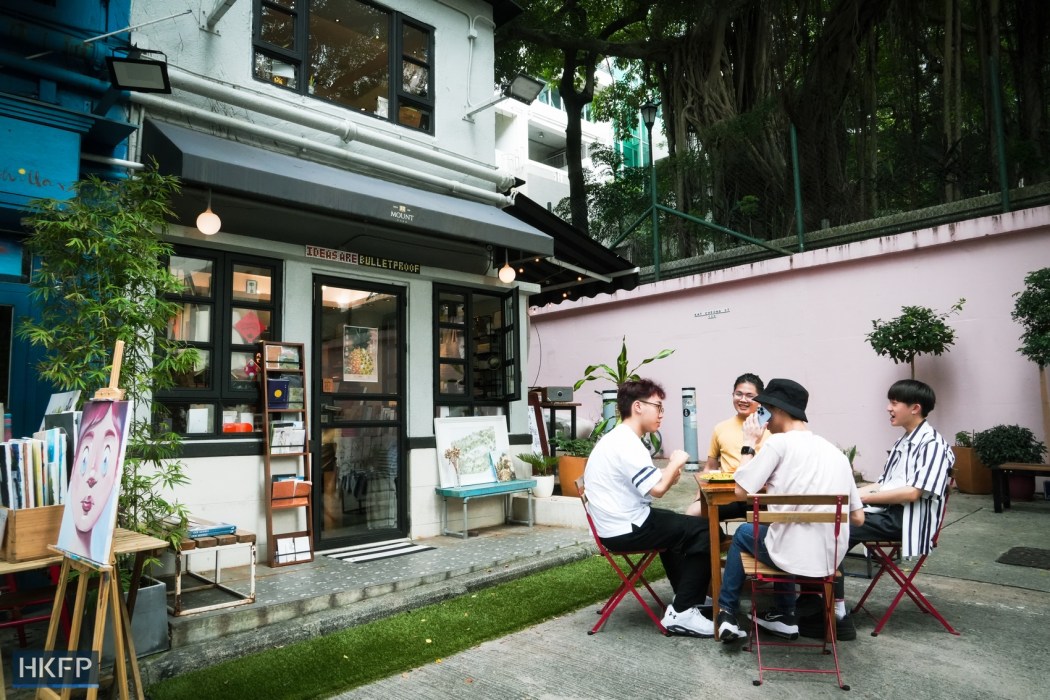
“People like to pop in, read and chat with my shop managers,” Sharon Chan, the store’s founder, says. “Artists here, they say this place gives them comfort and a sense of belonging. That is what I want… we are a community store.”
Mount Zero’s location, a precious street-level spot on a corner at the end of a pedestrian lane in Sheung Wan, works to its advantage. As does the fact that the two-storey store, so small it seems like it has been shrunk, spills out onto that largely car-free area.

It is here that Chan hosts talks, events, even dinners – often in collaboration with other independent businesses in the district. Mount Zero has welcomed everyone from barrister Margaret Ng and former scholar Benny Tai to the late actor Kenneth Tsang. When news broke in April of Tsang’s death, an image of the actor outside the store was posted to the bookstore’s Instagram feed. “I remember you said that day, this community is a very special place,” the caption read.
“The events or the activities, they help people, the community,” Chan says. “The people who are staying here, they want to do something… and let people hear our voice.”
To-day Bookstore also runs events, mainly for youngsters who live on the island. The first involved a third-generation Cheung Chau resident, who took a group of children off in search of plants, from which they later made a collage.
As for Have a Nice Stay, Lau says there are plans to host some once the bookstore has completed its “trial run.”
“At that time, I think we will try and launch some workshops – photography workshops, writing workshops, some cultural events,” Lau says.
‘Just don’t be afraid’
Chan, who is gentle and down to earth but fiercely passionate about books and reading, opened Mount Zero in 2018, when “everything was different.” The following year, a controversial amendment to Hong Kong’s extradition bill was proposed that would have allowed the city to accept extradition requests from mainland China, where the justice system is notoriously opaque.

It sparked mass demonstrations, with hundreds of thousands of Hongkongers taking to the streets. As the months drew on, protests escalated into sometimes violent displays of dissent against police behaviour, amid calls for democracy and anger over Beijing’s encroachment. Then in 2020, the arrival of the Covid-19 pandemic and related social distancing restrictions all but cleared the streets before Beijing imposed the national security law that June, spreading a chill through civil society.
“At the beginning we mainly provided literature and art books… but since 2019, lots of the books are about this society, this community, Hong Kong. People don’t want to read that much literature, they want to read something related to their city, to their life.”
To facilitate that, Chan has turned publisher, so far producing limited runs of four books, two by former Apple Daily columnists, a novel by a young Hong Kong writer, and Wild Boar, by playwright Candace Chong. “That one makes me so excited… we’re going to print 5,000 copies. Crazy, right? Because I don’t know if we can still have a second print,” Chan says. “It’s about journalists. Do they still have the freedom to write?”

Bookselling in Hong Kong became a potentially precarious profession in 2015, when five staff members of Causeway Bay Books went missing, eventually turning up in the custody of mainland Chinese authorities. The bookstore had been popular with Chinese tourists in search of titles considered contraband in the mainland.
And despite books being pulled from libraries and schools, Chan does not entertain questions about the freedom to read. She will continue to stock Mount Zero as she chooses, she says, or until she is told otherwise. “I don’t understand why they always want people to self-censor,” she says. “Just don’t be afraid.”
Lau takes a similar stance. “We will not break the law,” he says. “If they tell me [there are] some books you cannot sell, then I will not. But I still believe that what is not disallowed is allowed… I am not doing self-censorship. I don’t think it’s necessary.”
First draft of history
Two framed front pages of two Hong Kong newspapers hang to the right of the cashier’s desk at Have a Nice Stay. On the left is the first issue of Apply Daily – the popular pro-democracy tabloid that ceased operations last June after a national security investigation – from June 20, 1995.
To its right is the front page of the South China Morning Post from July 1, 1997, the day that Hong Kong was handed back to China from Britain. Lau explains that it is “special” because most of the cover was dedicated to two Chinese characters – 回歸, “wui gwai” or “return” – an uncommon occurrence for the English-language newspaper.
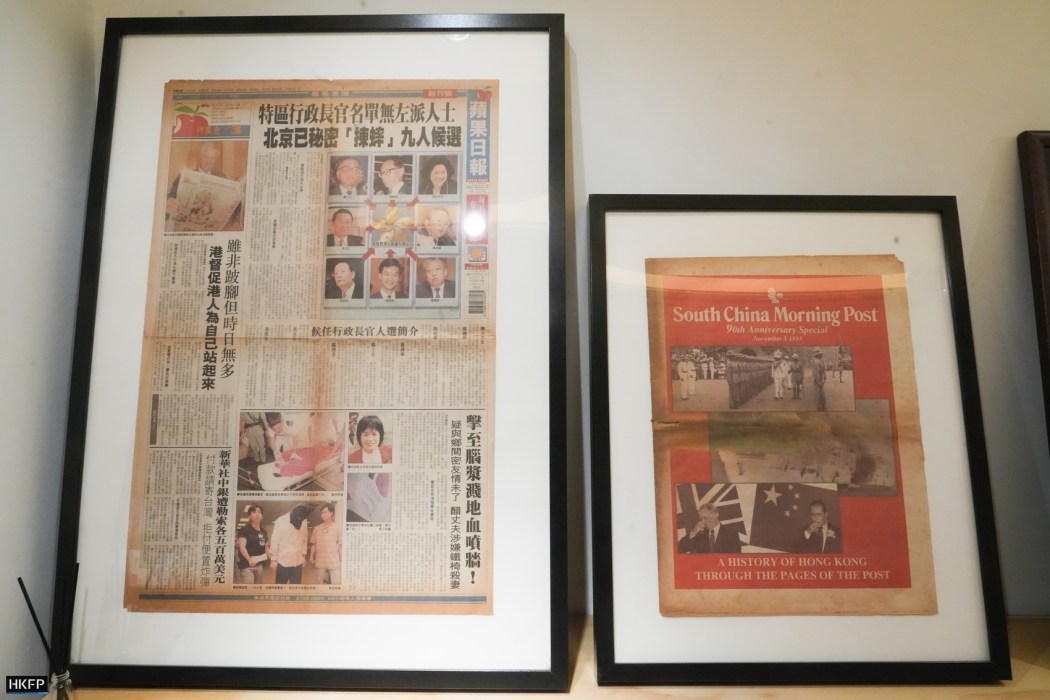
Beneath these mounted moments of Hong Kong’s history are other magazines, publications and books that recall times past, even if it was just a short time ago. “Those are not for sale,” Lau says, “because most of them are the last copies.”
Instead, patrons are invited to take them, settle into the sofa or one of several chairs and read them in the store, “just like a library.”
“News is the first draft of history… we deeply believe it,” Lau says. Later, he adds, “we don’t want it to vanish.”
To-day Bookstore has its own shelf of books that cannot be bought. “Some of them are only for reading in here because they’re quite rare or they’re not published anymore,” Lai says.

At Mount Zero, reading is also at the top of Chan’s agenda. “I want people to read more than I want them to buy books,” she says.
“We have so many, so many young readers. It’s unbelievable,” Chan says “I don’t know why they choose to come here and buy and read and chat to our people. I think, maybe, because we have no rules here, we just let them feel that they’re free, that they can do anything here.”
She says that she believes people are reading more these days “as kind of a sign against the government and what the government tells them to do. It’s a little gesture.”
Another “little gesture” appeared above Mount Zero’s door one night in 2019 – a mosaic sign that reads “ideas are bulletproof,” a popular refrain during the protests originally from the V for Vendetta movie. “My readers put it there, they didn’t even ask me,” Chan says. “You can see it’s not perfect, but it’s perfect.”

Books, and the ideas contained within them “are shaping what young people think and what young people would like to tell another generation,” Chan says.
“I do think every neighbourhood deserves a bookstore.”
Support HKFP | Policies & Ethics | Error/typo? | Contact Us | Newsletter | Transparency & Annual Report | Apps
Help safeguard press freedom & keep HKFP free for all readers by supporting our team

LATEST FROM HKFP
HKFP has an impartial stance, transparent funding, and balanced coverage guided by an Ethics Code and Corrections Policy.
Support press freedom & help us surpass 1,000 monthly Patrons: 100% independent, governed by an ethics code & not-for-profit.





